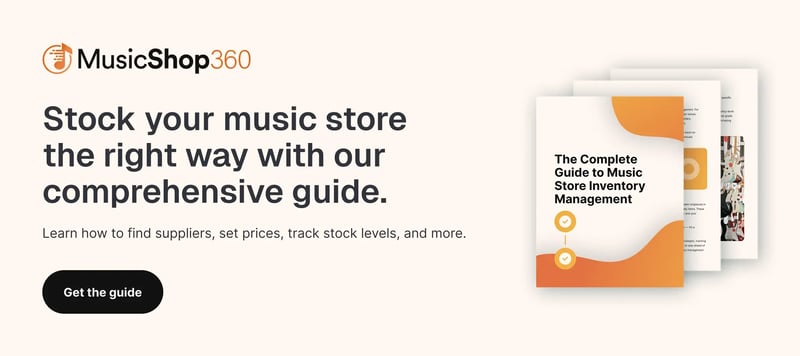
Like it or not, every retail business has to manage inventory.
Good inventory management keeps stock numbers consistent, products turning over, and profits high. Neglecting it leads to shelves of instruments that won’t move, stockouts of your most popular products, and stagnant sales.
Luckily, modern digital tools have made inventory management easier. Point of sale (POS) systems often include features designed to keep product counts accurate and provide reporting data that informs purchasing decisions.
In this blog, we’ll go over four common music store inventory challenges and share solutions to help you overcome them and boost your business’ success.
Let’s get started.
4 Common Music Inventory Challenges and How To Fix Them
To get your inventory under control, start by tackling these four key issues.
1. Building the Right Product Mix
The challenge:
Each music store has a unique product mix, but some struggle with low sales because they try to carry too many different kinds of products and fail to create a cohesive brand identity.
For example, if you aim to offer affordable instruments to families and beginners, there’s a large market for that. But if you also stock a few high-end pianos, they may not sell because customers might not expect to find these items at your store or your target audience may not align with the product.
How to fix it:
No matter what type of music store you choose to run, the key is to create a consistent brand identity and stick to it.
Here are a few examples of different kinds of music stores:
- General musical instrument store
- Guitar shop
- Violin store
- Piano store
- Affordable instruments for beginners
- High-end instruments for professionals
When you keep your products aligned with a consistent theme, it’s easier to communicate what your business offers and build a community of loyal customers. Once you’ve chosen the right instruments to put on the shelves, you can use sales data to identify which products perform best.
If a particular instrument is especially popular, consider ordering more. If another rarely sells, reduce its presence to make room for better-performing items.
Over time, you’ll discover the product mix that works best for your store and your customers, so you can maximize sales.
Related Read: How To Build a Strong Brand Identity: 6 Tips for Music Stores
2. Finding and Diversifying Reliable Suppliers
The challenge:
Music stores often source instruments from large online suppliers, but finding reliable ones can be difficult.
Some vendors frequently raise prices, which reduces your profit margin and may force you to raise your own prices. Others have shipping delays that make it hard to keep shelves stocked, and some even deliver products with defects that frustrate your customers.
Let’s say you’re expecting a shipment of instruments to rent or sell to students at the beginning of a new school year. If a supplier can’t fulfill your order on time, you could miss out on a major sales opportunity and damage your reputation.
This forces shoppers to find somewhere else to get their instruments, and the next time they need something music-related, they’ll likely choose a competitor first.
How to fix it:
To avoid issues like these, work with reliable vendors who offer high-quality products at reasonable prices. Partnering with multiple suppliers is a smart way to cover your bases in case of a supply chain issue.
Some industry-specific POS solutions give access to extensive supplier catalogs, so you can compare products and prices across providers. This makes it easier to diversify your inventory sources, shields your business from the effects of supply chain issues, and helps you find vendors you can trust.
3. Keeping Inventory Levels in Check
The challenge:
So you’ve decided what products to buy and who to buy them from — you’ve made progress, but you’re not out of the woods yet. If you fail to buy the right amount of each instrument, stockouts and overstock are inevitable.
In any retail store, some products are more popular than others. Failing to adjust order quantities based on customer demand can leave top-selling items sold out while other inventory sits on shelves for months. This slows inventory turnover and disrupts cash flow.
How to fix it:
At your music store, you might reliably sell multiple guitars each week but only one cello every few months. Ordering these instruments at the same rate creates bottlenecks in inventory turnover.
Monitoring customer demand allows you to increase your guitar orders while decreasing your cello orders, keeping products moving and cash flow consistent.
A POS system helps manage inventory levels in several ways:
- Track each item with a barcode.
- Adjust counts when you make sales.
- View sales history to predict customer demand.
- Use automatic reorder points to keep shelves stocked.
These platforms have transformed the process of tracking inventory counts. When you purchase new stock, you can add each item to your system with a barcode. Once the item sells, your digital count updates automatically. With a cloud-based solution, you can check inventory totals from any web-enabled device.
POS systems also provide detailed sales reports to predict future demand, and some even allow you to set automatic reorder points for fast-moving products. When an item reaches a minimum threshold, an order is placed to restock it, so you never run out of your most popular products.
Related Read: Master Music Shop Inventory Management in 10 Steps
4. Handling Seasonal Demand Swings
The challenge:
Once you’ve built a solid purchasing strategy, it can feel like you’re finally ordering the right amount of stock to meet customer demand. Then a seasonal rush or slow period throws things off, and an item suddenly sells out or becomes overstocked. This is a common challenge for music stores, but by planning for seasonal ebbs and flows in advance, you can outsmart it.
How to fix it:
If you’ve been in the business for years, you already know when the busy times are. Back-to-school season and the holidays often bring sales spikes, while summer tends to be slower.
To manage inventory during these shifts, adjust supply in advance. Before the back-to-school rush, for example, stock up on your most in-demand student rental instruments, which may include flutes, clarinets, saxophones, and trumpets.
Display these instruments prominently to boost sales. As demand tapers off, use discounts and promotions to move excess inventory.
Reviewing sales data closely also helps uncover more subtle trends and prepare for them. Applying these insights to adjust inventory during seasonal fluctuations helps keep your store profitable year-round.
Related Read: 6 Ways Vendor Catalogs Save Your Music Store Time and Money
Overcome Music Store Inventory Challenges With Music Shop 360
Your inventory management approach can make or break your music store. Implementing proven strategies — and using the right digital tools — helps keep stock moving and sales consistent.
Modern POS systems have simplified inventory management by giving small business owners clearer visibility into their operations.
Music Shop 360 is a cloud-based POS solution built specifically for music stores. Its dedicated inventory management features make it easy to track stock levels for each product and make adjustments as needed. Our software also connects you with music suppliers, helping you find the best instruments and accessories for your customers.
With Music Shop 360, you can manage rentals, repairs, and lessons through dedicated service modules, alongside core retail tasks like payment processing, e-commerce, and marketing.
To see what Music Shop 360 can do for your store, schedule a demo today!




 by
by 





